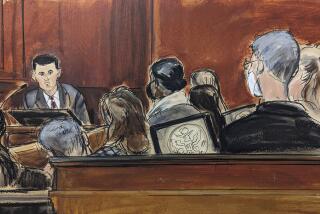Elderly Saver Testifies at Keating Trial
- Share via
The final prosecution witness against Charles H. Keating Jr. was a replay of the first: an elderly Lincoln Savings customer who related meekly Thursday in Los Angeles Superior Court how a “safe” investment turned out to be a worthless junk bond.
In a voice that quavered at times, Bertha Rettig told jurors that she and her husband, Warren, went to the Woodland Hills Lincoln branch to “roll over” a $30,000 certificate of deposit.
Instead, the teller sent her to an office next door, where a pleasant young man had an investment to offer with a higher interest rate, 10.5% bonds from Lincoln’s parent, Keating’s American Continental Corp. in Phoenix.
She said she couldn’t remember if he mentioned whether the bonds were insured. He concentrated instead on showing her a map of ACC’s development projects in Arizona and an impressive brochure about Keating’s sumptuous Phoenician Hotel, Rettig testified.
“It sounded very interesting and it sounded safe,” she said, so she doubled the amount she had thought she might invest, to $10,000.
She and her husband received one half-month interest payment, $61.25, before learning that American Continental had collapsed into bankruptcy and Lincoln had been seized in the costliest S&L; failure in history.
Rettig bought the bond on Feb. 10, 1989--four days before Lincoln’s president shut down the bond sales and two months before regulators shut down Lincoln.
Regulators later said rash investments and dubious deals, funded with money from Lincoln depositors and American Continental bondholders, cost taxpayers $2.6 billion. Thousands of small investors lost $250 million on bonds.
During the trial, prosecutors have tried to prove that the Rettigs and 19 other Lincoln investors lost money because Keating never adequately revealed his companies’ shaky finances or what would happen if he lost a ferocious battles with regulators.
On Thursday, the defense countered that the government’s two-month fraud prosecution hasn’t shown that Keating knew about, encouraged or aided in any deceptions of people such as Rettig, who is 77.
Rettig’s testimony came two months after Leon Bonan, 80, took the stand to testify how he and his wife lost $101,000 under similar circumstances.
Keating’s lawyer, Stephen C. Neal, maintains that it has never been shown that Keating knew of any lies or omissions that cheated bond buyers.
Cross-examining prosecution witnesses, he tried to build a wall between Keating and the bonds. He drew a portrait of a bond program designed by top lawyers and accountants, who directed what bond sellers could say and made sure they were told to describe the securities as uninsured and riskier than CDs.
More to Read
Inside the business of entertainment
The Wide Shot brings you news, analysis and insights on everything from streaming wars to production — and what it all means for the future.
You may occasionally receive promotional content from the Los Angeles Times.








